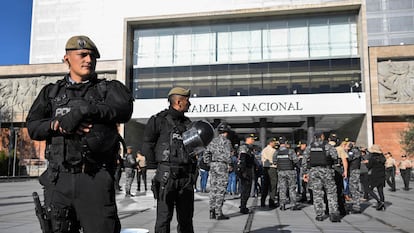Ecuador’s president dissolves National Assembly amid impeachment proceedings against him
The National Electoral Council now has seven days to call presidential and legislative elections, which must be held within 90 days

Ecuadorian President Guillermo Lasso on Wednesday put an end to impeachment proceedings against him by dissolving the opposition-led National Assembly, which had accused him of embezzlement.
The conservative president, who has denied wrongdoing, can govern for up to six months by decree under a constitutional provision that had not previously been used, and his move swiftly drew pushback from critics who said his removal from office had been imminent.
Soon after Lasso’s announcement, the South American country’s top military leader warned that the armed forces would act “firmly” if any violence erupts. A strong contingent of military and police officers blocked access around the National Assembly building in Ecuador’s capital, Quito.
In a televised message, Lasso accused the National Assembly of focusing “on destabilizing the government.” He called his move “democratic,” and a way to give “people the power to decide their future in the next elections.”
Lawmakers had accused Lasso of not having intervened to end a contract between the state-owned oil transport company and a private tanker company. They argued Lasso knew the contract was full of irregularities and would cost the state millions in losses, something that the president rejects as untrue.
The National Electoral Council now has seven days to call presidential and legislative elections, which must be held within 90 days. Those elected will finish the terms of Lasso and the lawmakers he ousted, which had been set to end in May 2025. Lasso can choose to run in the election.
Lasso, a former banker, was elected in 2021 and has clashed from the start with a strong opposition in the 137-member National Assembly. He defended himself before Congress on Tuesday, insisting there was no proof or testimony of wrongdoing.
After Lasso announced his decision Wednesday, the head of the Joint Command of the Armed Forces, Gen. Nelson Proaño, called on Ecuadorians to maintain respect for the law and warned against rupturing the constitutional order through violence.
If violence erupts, the armed forces and police “will act firmly,” he said.
Lasso’s move quickly led to criticism from the powerful Confederation of Indigenous Nationalities, which in recent years has carried out protests that have virtually paralyzed the country. Its leader, Leonidas Iza Salazar, said Lasso “launched a cowardly self-coup with the help of the police and the armed forces, without citizen support” as he faced “imminent dismissal.”
Will Freeman, fellow for Latin America studies at the Council on Foreign Relations, said Lasso’s decision signals that “he was aware the opposition had enough votes to impeach him, and maybe then some.” He said mass protests are likely in the coming days.
“It’s also hard to imagine Lasso is making this move without the tacit support of top brass in the military,” he said. “In the past, protests have tended to turn destructive quickly — and security forces have also cracked down.”
In dissolving the assembly, Lasso made first use of the Ecuador presidency’s nuclear option in conflicts with the legislative branch. Known colloquially as the “death cross,” the option to disband and temporarily rule by decree was established in the constitution in 2008.
The measure is aimed at avoiding protracted periods of political paralysis, Ecuadorian legal analyst Ramiro Aguilar said. “A conflict of this nature can last four years, and it is a conflict that paralyzes the country.”
However, the country also loses democratic debate during the interim. “There will be a unilateral voice of the executive branch imposing a course without the counterweight of the assembly and the country loses credibility, because it is left with a weak institutional framework,” Aguilar said.
Sign up for our weekly newsletter to get more English-language news coverage from EL PAÍS USA Edition
Tu suscripción se está usando en otro dispositivo
¿Quieres añadir otro usuario a tu suscripción?
Si continúas leyendo en este dispositivo, no se podrá leer en el otro.
FlechaTu suscripción se está usando en otro dispositivo y solo puedes acceder a EL PAÍS desde un dispositivo a la vez.
Si quieres compartir tu cuenta, cambia tu suscripción a la modalidad Premium, así podrás añadir otro usuario. Cada uno accederá con su propia cuenta de email, lo que os permitirá personalizar vuestra experiencia en EL PAÍS.
¿Tienes una suscripción de empresa? Accede aquí para contratar más cuentas.
En el caso de no saber quién está usando tu cuenta, te recomendamos cambiar tu contraseña aquí.
Si decides continuar compartiendo tu cuenta, este mensaje se mostrará en tu dispositivo y en el de la otra persona que está usando tu cuenta de forma indefinida, afectando a tu experiencia de lectura. Puedes consultar aquí los términos y condiciones de la suscripción digital.








































